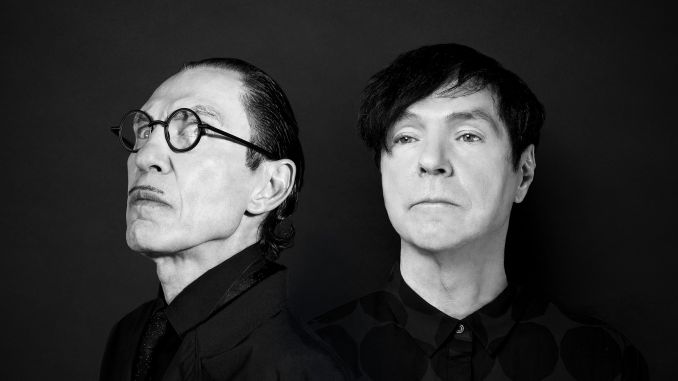I didn’t know Edgar Wright would eventually direct a documentary about Sparks when I saw him tweet about a band I’d never heard of in the late 2010s. But, like on so many others before, word of mouth worked and I was hooked on the elusive musicians as soon as I searched them out. “Elusive” here works a number of ways: Elusive mythologically, as the two frontmen come off in interviews as coy tricksters; elusive musically, as every other album takes such a dramatic zag that even zigging fans were left in the dust; and elusive popularly, as the previous two descriptors made it difficult for them to hold onto mainstream appeal…though fellow musicians, arty Europeans and other in-the-know bastions of Cool kept spreading the word. Now the seeds that social media fanboy Wright planted years ago have sprouted into a documentary epic cultivated by filmmaker Wright. The Sparks Brothers is a thorough and charming assessment and appreciation of an idiosyncratic band, and the highest praise you could give it is that it shares a sensibility with its inimitable musicians.
Not an easy task when it comes to Ron and Russell Mael. The Californian brothers have been running Sparks since the late ‘60s (yeah, the ‘60s), blistering through genres as quickly as their lyrics make and discard jokes. Glam rock, disco, electronic pioneering—and even when they dip into the most experimental and orchestral corners of their musical interests, they maintain a steady power-pop genius bolstered by Russell’s fluty pipes and Ron’s catchy keys. It’s here, in Sparks’ incredible range yet solidified personality, that you quickly start to understand that The Sparks Brothers is the marriage of two perfect subjects that share a mission. Experts in one art form that are interested in each others’, Ron and Russell bond with Wright over a wry desire to have their fun-poking and make it art too. One made a trilogy of parodies that stands atop its individual genres (zombie, cop, sci-fi movies). The others made subversive songs like “Music That You Can Dance To” that manage to match (and often overtake) the very bops they razz.
Their powers combined, The Sparks Brothers becomes a music doc that’s self-aware and deeply earnest. Slapstick, with a wide range of old film clips delivering the punches and pratfalls, and visual gags take the piss out of its impressive talking heads whenever they drop a groaner music doc cliché. “Pushing the envelope?” Expect to see a postal tug-of-war between the Maels. This sense of humor, appreciating the dumbest low-hanging fruit and the highest brow reference, comes from the brothers’ admiration of seriously unserious French filmmakers like Jacques Tati (with whom Sparks almost made a film; remember, they love movies) and of a particularly formative affinity for British music. It’s no wonder that Sparks found greater success during their stays and tours abroad because, as Lance Robertson notes, “Sparks are a lot of things that Americans don’t seem to care for.”
Wright reflects their unabashed, all-American yet somehow un-American weirdness with endearing animation (both cartoony scribbles and scrappy stop-motion), tongue-in-cheek reenactments and a constant return to simple, charismatic footage of the brothers themselves—Russell with his Bambi stare and heartthrob jawline, Ron with his signature ‘stache and mesmerizing expression. Shot in starkly gripping black-and-white in the same style as the guests (ranging from Weird Al to Mike Myers to Björk to Beck), the brothers have the easy ribbing affection in front of the camera that you’d expect from two people who’ve been together forever, with much of that being spent in front of audiences.
The septuagenarian rock gods are a pleasure to watch joke around in the present day, but a jaw-dropping amount of archival records, ranging from actual songs to promotional/behind-the-scenes photos to TV clips, compose the kind of tangible legacy most artists can only dream about. They also make Wright’s film utterly comprehensive…even if he and editors Paul Trewartha and Tobias Zaldua may have felt like they’d discovered Borges’ Book of Sand in the edit bay. Since the film moves along the band’s career in chronological order, the song selection from their deep discography was likely a little easier, but it’s still impressive that it sustains the film’s length while constantly shifting and updating the mood.
A mastery of match-cuts we’ve seen demonstrated in all of Wrights films is enhanced by his editors’ music doc chops as they play with visual tempo, chopping things up into flashes or ogling long performances. Mixed with that aforementioned collage of form, and you get a film as playful as the Tim Burton manga adaptation that Sparks nearly scored. And one far more fun than Rollercoaster, the trashy 1977 disaster movie Sparks appeared in. The documentary gives such a lovely breakdown of the brothers’ lasting love of cinema that the climactic reveal that Annette (the upcoming Marion Cotillard and Adam Driver musical they wrote for Leos Carax) would be an achieved lifelong ambition is just as moving as any of the film’s musical setbacks or comebacks. My only regret is that Knock Off, the 1998 Jean-Claude Van Damme and Rob Schneider movie the duo scored, never comes up.
But as seemingly total as this movie is, it could never contain all that is Sparks. It doesn’t entirely tear down facades, as even Wright’s most personal works still emote through a protective shell of physical comedy and references, but you get a sense of the Maels as workers, brothers, artists and humans on terms that they’re comfortable with. The nearly two-and-a-half-hour film is an epic, there’s no denying that. You won’t need another Sparks film after this one. Yet it’s less an end-all-be-all biography than an invitation. It’s that tweet I saw years ago, in feature-length form, beckoning newcomers and longtime listeners alike through its complete understanding of and adoration for its subjects.
Director: Edgar Wright
Release Date: June 18, 2021
Jacob Oller is Movies Editor at Paste Magazine. You can follow him on Twitter at @jacoboller.
For all the latest movie news, reviews, lists and features, follow @PasteMovies.




